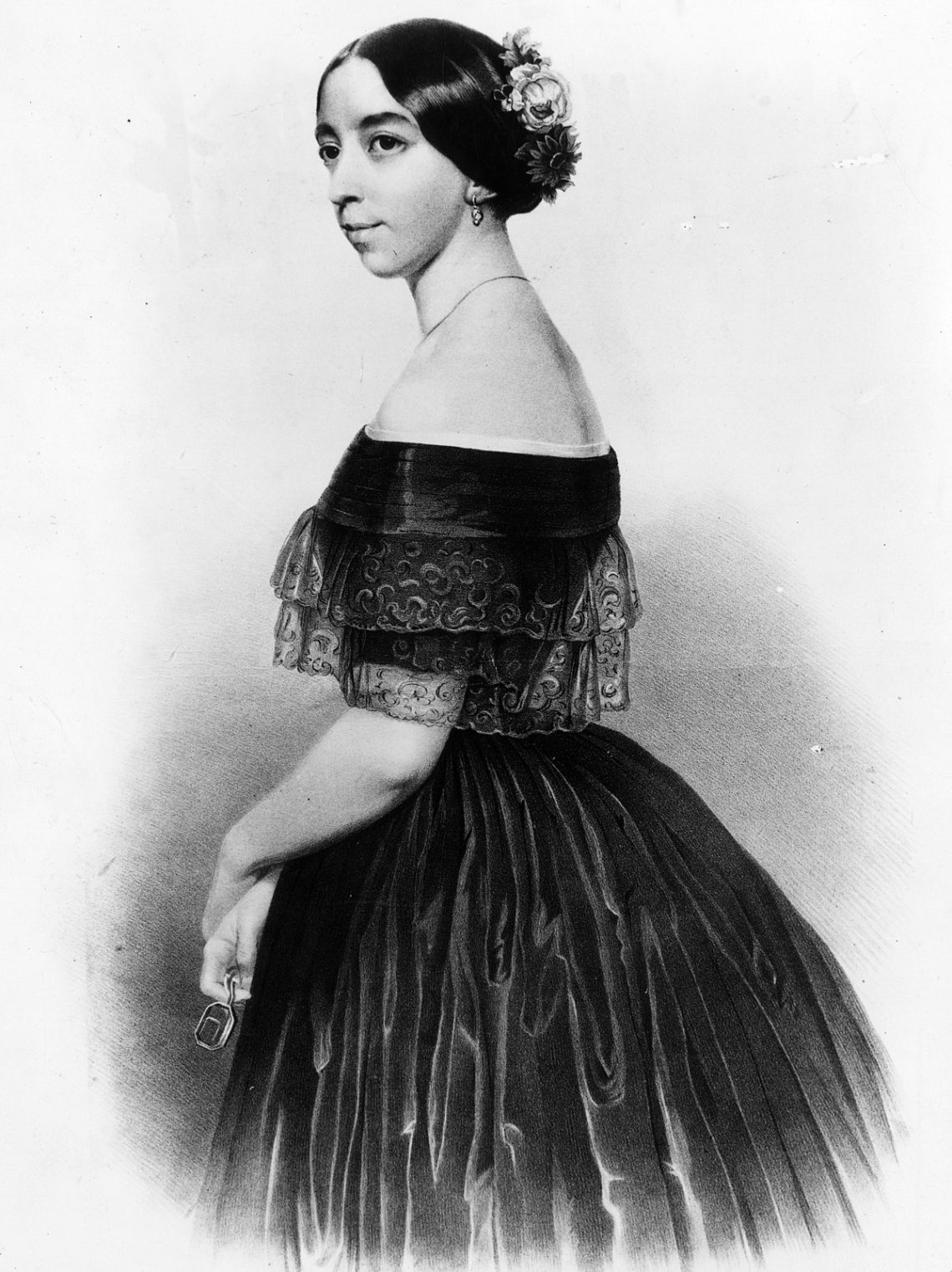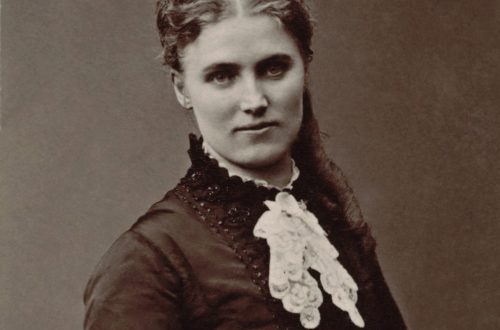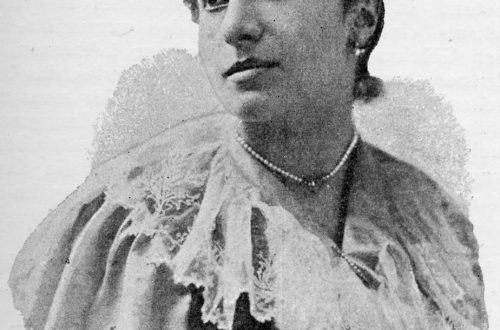
Pauline Viardot-Garcia |
Pauline Viardot-Garcia
The Russian poet N. Pleshcheev wrote in 1846 the poem “To the Singer”, dedicated to Viardo Garcia. Here is its fragment:
She appeared to me … and sang a sacred hymn, – And her eyes burned with divine fire … That pale image in her I saw Desdemona, When she bends over the golden harp, About the willow sang a song and interrupted the groans A dull overflow of that old song. How deeply she comprehended, studied The one who knew people and the secrets of their hearts; And if a great one rose from the grave, He would put his crown on her forehead. Sometimes young Rosina appeared to me And passionate, like the night of her native country … And listening to her magical voice, In that fertile land I aspired with my soul, Where everything enchants the ear, everything delights the eyes, Where the vault of the sky shines with eternal blue, Where the nightingales whistle on the branches of the sycamore, And the shadow of the cypress trembles on the surface of the waters!
Michel-Ferdinanda-Pauline Garcia was born in Paris on July 18, 1821. Polina’s father, tenor Manuel Garcia was then at the zenith of his fame. Mother Joaquin Siches was also previously an artist and at one time “served as an adornment of the Madrid scene.” Her godmother was Princess Praskovya Andreevna Golitsyna, after whom the girl was named.
The first teacher for Polina was her father. For Polina, he composed several exercises, canons and ariettas. From him, Polina inherited a love for the music of J.-S. Bach. Manuel Garcia said: “Only a real musician can become a real singer.” For the ability to diligently and patiently engage in music, Polina received the nickname Ant in the family.
At the age of eight, Polina began to study harmony and composition theory under the guidance of A. Reicha. Then she began to take piano lessons from Meisenberg, and then from Franz Liszt. Until the age of 15, Polina was preparing to become a pianist and even gave her own evenings in the Brussels “Artistic Circle”.
She lived at that time with her sister, the magnificent singer Maria Malibran. Back in 1831, Maria told E. Leguva about her sister: “This child … will eclipse us all.” Unfortunately, Malibran tragically died very early. Maria not only helped her sister financially and with advice, but, without suspecting it herself, played a big role in her fate.
Pauline’s husband will be Louis Viardot, Malibran’s friend and adviser. And Maria’s husband, Charles Berio, helped the young singer overcome the most difficult first steps on her artistic path. The name Berio opened the doors of concert halls for her. With Berio, she first publicly performed solo numbers – in the hall of the Brussels City Hall, in the so-called concert for the poor.
In the summer of 1838, Polina and Berio went on a concert tour of Germany. After the concert in Dresden, Polina received her first valuable gift – an emerald clasp. Performances were also successful in Berlin, Leipzig and Frankfurt am Main. Then the artist sang in Italy.
Pauline’s first public performance in Paris took place on December 15, 1838, in the hall of the Renaissance Theater. The audience warmly received the young singer’s performance of several technically difficult pieces that required genuine virtuosity. On January 1839, XNUMX, A. de Musset published an article in the Revue de Demonde, in which he spoke about the “voice and soul of Malibran”, that “Pauline sings as she breathes”, ending everything with poems dedicated to the debuts of Pauline Garcia and Eliza Rachel .
In the spring of 1839, Garcia made her debut at the Royal Theater in London as Desdemona in Rossini’s Otello. The Russian newspaper Severnaya Pchela wrote that she “aroused the liveliest interest among music lovers”, “was received with applause and called twice during the evening … At first she seemed to be timid, and her voice trembled at high notes; but soon they recognized her extraordinary musical talents, which make her a worthy member of the Garcia family, known in the history of music since the XNUMXth century. True, her voice could not fill the huge halls, but one must know that the singer is still very young: she is only seventeen years old. In dramatic acting, she showed herself to be Malibran’s sister: she discovered the power that only a true genius can have!
On October 7, 1839, Garcia made his debut at the Italian Opera as Desdemona in Rossini’s Otello. The writer T. Gautier welcomed in her “a star of the first magnitude, a star with seven rays”, a representative of the glorious artistic dynasty of Garcia. He noted her taste in clothing, so different from the costumes common for Italian entertainers, “dressing, apparently, in a wardrobe for scientific dogs.” Gauthier called the artist’s voice “one of the most magnificent instruments that can be heard.”
From October 1839 to March 1840, Polina was the main star of the Italian Opera, she was “at the zenith of fashion”, as reported to Liszt M. D’Agout. This is evidenced by the fact that as soon as she fell ill, the theater management offered to return the money to the public, although Rubini, Tamburini and Lablache remained in the performance.
This season she sang in Otello, Cinderella, The Barber of Seville, Rossini’s Tancrede and Mozart’s Don Giovanni. In addition, in concerts, Polina performed works by Palestrina, Marcello, Gluck, Schubert.
Oddly enough, it was success that became the source of subsequent troubles and sorrows for the singer. Their reason is that the eminent singers Grisi and Persiani “did not allow P. Garcia to perform significant parts.” And although the huge, cold hall of the Italian Opera was empty most of the evenings, Grisi did not let the young competitor in. Polina had no choice but to tour abroad. In mid-April, she went to Spain. And on October 14, 1843, the spouses Polina and Louis Viardot arrived in the Russian capital.
The Italian opera began its season in St. Petersburg. For her debut, Viardot chose the role of Rosina in The Barber of Seville. The success was complete. St. Petersburg music lovers were particularly delighted with the scene of the singing lesson, where the artist unexpectedly included Alyabyev’s Nightingale. It is significant that many years later Glinka in his “Notes” noted: “Viardot was excellent.”
Rosina was followed by Desdemona in Rossini’s Otello, Amina in Bellini’s La Sonnambula, Lucia in Donizetti’s Lucia di Lammermoor, Zerlina in Mozart’s Don Giovanni and, finally, Romeo in Bellini’s Montecchi et Capulets. Viardot soon made a close acquaintance with the best representatives of the Russian artistic intelligentsia: she often visited the Vielgorsky house, and for many years Count Matvey Yuryevich Vielgorsky became one of her best friends. One of the performances was attended by Ivan Sergeevich Turgenev, who was soon introduced to a visiting celebrity. As A.F. Koni, “enthusiasm entered Turgenev’s soul to its very depths and remained there forever, affecting the entire personal life of this monogamist.”
A year later, the Russian capitals again met Viardot. She shone in the familiar repertoire and won new triumphs in Rossini’s Cinderella, Donizetti’s Don Pasquale and Bellini’s Norma. In one of her letters to George Sand, Viardot wrote: “See what an excellent audience I am in contact with. It is she who makes me make great strides.”
Already at that time, the singer showed interest in Russian music. A fragment from Ivan Susanin, which Viardot performed together with Petrov and Rubini, was added to Alyabyev’s Nightingale.
“The heyday of her vocal means fell on the seasons of 1843-1845,” writes A.S. Rozanov. – During this period, lyrical-dramatic and lyric-comic parts occupied a dominant position in the artist’s repertoire. The part of Norma stood out from it, the tragic performance outlined a new period in the operatic work of the singer. The “ill-fated whooping cough” left an indelible mark on her voice, causing it to fade prematurely. Nevertheless, the culminating points in Viardot’s operatic activity must first of all be considered her performances as Fidesz in The Prophet, where she, already a mature singer, managed to achieve a remarkable harmony between the perfection of vocal performance and the wisdom of the dramatic embodiment of the stage image, the “second climax” was the part of Orpheus, played by Viardot with brilliant persuasiveness, but less perfect vocally. Less important milestones, but also great artistic successes, were for Viardot the parts of Valentina, Sappho and Alceste. It was precisely these roles, full of tragic psychologism, with all the diversity of her theatrical talent, that most of all corresponded to the emotional warehouse of Viardot and the nature of her brightly temperamental talent. It was thanks to them that Viardot, the singer-actress, occupied a very special position in the art of opera and the artistic world of the XNUMXth century.”
In May 1845, the Viardots left Russia, heading for Paris. This time Turgenev joined them. And in the fall, the St. Petersburg season began again for the singer. New roles were added to her favorite parties – in the operas of Donizetti and Nicolai. And during this visit, Viardot remained the favorite of the Russian public. Unfortunately, the northern climate undermined the health of the artist, and since then she was forced to abandon regular tours in Russia. But this could not interrupt her ties with the “second fatherland.” One of her letters to Matvey Vielgorsky contains the following lines: “Every time I get into a carriage and go to the Italian Theater, I imagine myself on the road to the Bolshoi Theatre. And if the streets are a little foggy, the illusion is complete. But as soon as the carriage stops, it disappears, and I take a deep breath.
In 1853, Viardot-Rosina once again conquered the St. Petersburg public. I.I. Panaev informs Turgenev, who was then exiled to his estate Spasskoe-Lutovinovo, that Viardot “makes a splash in St. Petersburg, when she sings – there are no places.” In Meyerbeer’s The Prophet, she plays one of her best roles – Fidesz. Her concerts follow one after another, in which she often sings romances by Dargomyzhsky and Mikh. Vielgorsky This was the last performance of the singer in Russia.
“With great artistic persuasiveness, the singer twice embodied the images of biblical women,” writes A.S. Rozanov. – In the mid-1850s, she appeared as Mahala, Samson’s mother, in the opera Samson by G. Dupre (on the stage of a small theater in the premises of the famous tenor’s “School of Singing”) and, according to the author, was “grandiose and delightful” . In 1874, she became the first performer of the part of Delilah in Saint-Saens’ opera Samson et Delilah. The performance of the role of Lady Macbeth in the opera of the same name by G. Verdi is one of the creative achievements of P. Viardot.
It seemed that the years had no power over the singer. E.I. Apreleva-Blaramberg recalls: “On one of the musical “Thursdays” in Viardot’s house in 1879, the singer, who was then already under 60 years old, “surrendered” to requests to sing and chose a sleepwalking scene from Verdi’s Macbeth. Saint-Saens sat down at the piano. Madame Viardot stepped into the middle of the room. The first sounds of her voice struck with a strange guttural tone; these sounds seemed to come out with difficulty from some rusty instrument; but already after a few measures the voice warmed up and more and more captured the listeners … Everyone was imbued with an incomparable performance in which the brilliant singer so completely merged with the brilliant tragic actress. Not a single shade of a terrible atrocity of the agitated female soul disappeared without a trace, and when, lowering her voice to a gentle caressing pianissimo, in which complaint, and fear, and torment were heard, the singer sang, rubbing her white beautiful hands, her famous phrase. “No aromas of Arabia will erase the smell of blood from these little hands…” — a shiver of delight ran through all the listeners. At the same time – not a single theatrical gesture; measure in everything; amazing diction: every word was pronounced clearly; inspired, fiery performance in connection with the creative concept of the performed completed the perfection of singing.
Having already left the theatrical stage, Viardot manifests herself as a great chamber singer. A man of exceptionally multifaceted talent, Viardot also turned out to be a talented composer. Her attention as the author of vocal lyrics is primarily attracted by samples of Russian poetry – poems by Pushkin, Lermontov, Koltsov, Turgenev, Tyutchev, Fet. Collections of her romances were published in St. Petersburg and were widely known. On the libretto of Turgenev, she also wrote several operettas – “Too My Wives”, “The Last Sorcerer”, “Cannibal”, “Mirror”. It is curious that in 1869 Brahms conducted the performance of The Last Sorcerer at Villa Viardot in Baden-Baden.
She devoted a significant part of her life to pedagogy. Among the pupils and students of Pauline Viardot are the famous Desiree Artaud-Padilla, Baylodz, Hasselman, Holmsen, Schliemann, Schmeiser, Bilbo-Bachele, Meyer, Rollant and others. Many Russian singers went through an excellent vocal school with her, including F. Litvin, E. Lavrovskaya-Tserteleva, N. Iretskaya, N. Shtemberg.
Pauline Viardot died on the night of May 17-18, 1910.





